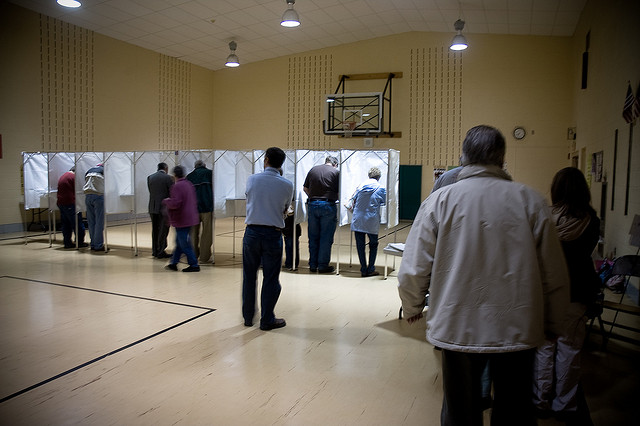Electoral management issues were the dog that didn’t bark in the Scottish night
After a long day, and night, of democracy, Dr. Toby James notes that few problems have been initially reported with the running of the Scottish independence referendum, despite the high turnout. This stands in stark, and indeed welcome, contrast to the 2010 general election.

Polling station (Credit: Heather Katsoulis, CC BY NC SA 2.0)
Scotland has voted no in the referendum. National soul searching, political repercussions and significant constitutional reform may (or may not) follow, and will be the focus of attention in days, weeks, months and years to come.
But consider for a moment the story that did not break on the night of the referendum: problems with the conduct of the poll. This was because there was no story to report: it seems as if the poll was well managed and run.
This sounds unremarkable, after all, our assumption is usually that election officials should be able to conduct and run a poll without any problems. But rewind back to the 2010 general election and recall the scenes of chaos on the night as voters were ‘locked out’ of polling stations and denied their right to vote. Queues formed at 10pm and voters were turned away. In some areas polling stations ran out of ballot papers. The causes of the problems included understaffing and confusion among those running poll stations about how they should manage a late surge. Some returning officers blamed the ‘higher than expected turnout’. Similar problems have been found in many other democracies, notably the USA.
Fast forward to last night and it seems that no similar scenes followed. There were additional polling stations so that people could participate. The impression of those observing so far is very clearly that the poll was well managed. Queues at polling stations were widely reported, but not ones that denied people voting this time.
This is not to say that there were not any problems at all. There were allegations ofelectoral fraud in Glasgow reported in the Scotsman. The numbers initially reported (10), however, is very low given that most of the 4.2million electorate voted. One tweet appeared to show someone living in England, but voting illegally in Scotland, but this was a rare example. Other tweets did provide examples of citizens claiming that they could not vote:

But these were rare, and others were more in jest:

A more detailed analysis and review will be needed. The Electoral Commission usually conducts a full review of each election and referendum in the UK and this should be carefully read. But the initial signs are good.
The question that follows is why? Turnout and registration rates were much higher and the strain on electoral administrators who stay up all night, should have been greater. There is also evidence that many electoral officials had their budgets squeezed after cuts were made to local government, after 2010 (see my chapter in here). It is important to understand this because problems with electoral management could have significantly undermined the legitimacy of the vote. So what was done well and what can be learnt?
More analysis will be needed, but the following factors may have been significant:
- Additional vigilance from electoral officials. The scenes from 2010 and the fact that high turnout was anticipated may have led to a re-doubling of efforts to prepare.
- The Chief Counting Officer for the referendum, convener of the Electoral Management Board for Scotland, provided detailed guidance, used a system of performance monitoring and gave directions to electoral officials. My research on performance standards and issuing centralised directions showed that these policy instruments can have some positive effects on electoral management, but also some negative ones.
- The hard work from electoral officials in Scotland.
Further analysis of the referendum is definitely necessary. But sometimes no news, is good news. If electoral administration was as successfully delivered at the referendum as it appears to be then this is very good news for democracy.
—
Note: this post represents the views of the author and not those of Democratic Audit or the LSE. Please read our comments policy before posting.
—
Dr. Toby James is a Senior Lecturer at the University of East Anglia. He has published widely on electoral administration and management, and is the author of Elite Statecraft and Election Administration (Palgrave, 2012). Further information is available on www.tobysjames.com.





 Democratic Audit's core funding is provided by the Joseph Rowntree Charitable Trust. Additional funding is provided by the London School of Economics.
Democratic Audit's core funding is provided by the Joseph Rowntree Charitable Trust. Additional funding is provided by the London School of Economics.
Interesting article and good points made, Toby. Isn’t it the case that having a practitioner as Chief Counting Officer rather than the head of a quango is what makes all the difference? The Scottish referendum CCO appeared to have local counting officers and their staff totally bought in and 100% on side. Contrast this referendum with the AV referendum where local counting officers were not bought in and there was notable friction between CCO, in that case was the Chair of the Electoral Commission, and local authorities.
Nice piece from @TobySJames on a v smooth referendum process, compared with shambolic 2010 general election: https://t.co/j0MI0J5gTb 1/2
Well done, colleagues! MT @democraticaudit: Electoral management issues – dog that didn’t bark in Scottish night https://t.co/Ouin1LNP16
Electoral management issues were the dog that didn’t bark in the Scottish night https://t.co/gaGARa82Gn
Electoral management issues were the dog that didn’t bark in the Scottish night https://t.co/0218sXfwHB